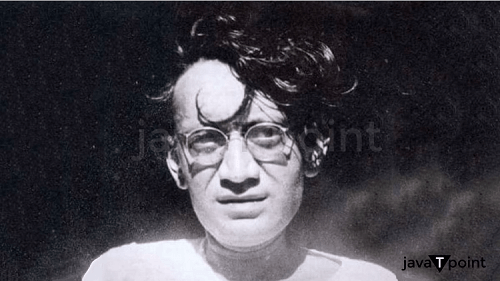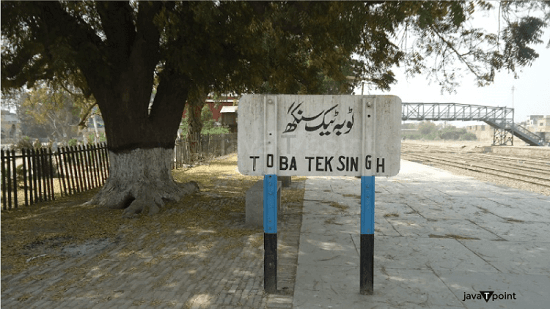Toba Tek Singh Summary by Saadat Hasan MantoAbout The AuthorSaadat Hasan Manto is among the writers, whose pen has produced works that were innovative for their time and whose depth the world is still struggling to understand. He was born into a respected family, his father, Ghulam Hasan, was a respected attorney and sessions judge. Manto called his mother, Sardar Begum, as Bibijan. Manto has been cunning and sneaky since he was a little boy. After failing twice, Manto succeeded on the admission test. His limited knowledge of Urdu was one factor in his failure. Safia was the wife of Manto. Manto and safia has three children 
Around the same time, Manto founded a drama club with the help of three or four friends, with plans to perform a play by Agha Hashr. This club barely lasted for 15 to 20 days due to an assault by Manto's father who destroyed the harmonium and tabla and said he didn't like such foolishness. Manto's tales have received less attention in the previous ten years than those of storytellers from other languages, including perhaps Urdu and Hindi. Manto was the only author after Anton Chekhov to gain recognition for his tales. In his whole life, he never wrote a book. Summary
In this short story, Manto explores the themes of identity, separation, trauma, and bewilderment in the exchange of them after partition. He does it via the use of a third-person narrator to portray the sad tale of the ignorant patients of a mental asylum in Lahore. Toba Tek Singh is the name of a location in Pakistan. The main character of the tale is Bishan Singh, a native of Toba Tek Singh. Everybody calls him Toba Tek Singh. The setting of the short story is mainly inside a lunatic asylum in Lahore and also at Wagah border check-post. A few years after the partition of India, it gives the description of the lunatic asylum and the exchange of Muslim, Sikh, and Hindu lunatics between Pakistan and India that took place. According to a popular short tale, the swap of the lunatic caused much uncertainty, which in turn led to hilarious events. There were debates over whether the lunatics included Pakistanis and Hindustanis. When asked what Pakistan was, one Muslim maniac who read the daily newspaper Zamindar claimed that it was a location in India. Similarly, a mentally ill Sikh questioned another Sikh why they were being deported to India, where they were unable to understand the native language. The other lunatic responded that he knew the language of Hindostoras and he blamed India. Another Muslim yelled, "Pakistan Zindabad." None of the prisoners were completely lunatic. Some of them were murderers whose families had succeeded in keeping them thereby paying off the guards to spare them the death punishment. Despite their lack of news knowledge, they believed that a guy by the name of Quid-E-Azam Mohammad Ali Jinnah had founded the Muslim nation of Pakistan. They had no knowledge of Pakistan's location. As a result, people were mixing up Pakistan with India. One prisoner climbed a tree and expressed a desire to reside there. He voiced his dismay at his Sikh and Hindu friends leaving him to travel to India after descending from the tree. An engineer who is Muslim and has never interacted with anybody handed one of the attendants all of his clothing, then rushed into the garden. Another Muslim who took bath fifteen times in a day declared himself as Mohammad Ali Jinnah while a Sikh also announced that he was Master Tara Singh. A Hindu lawyer had serious concerns about Amritsar, where his beloved daughter resided, joining India. Two Anglo-Indians were also concerned about whether or not there will be a distinct European ward. There was also a Sikh who had been working there for the last 15 years and was often seen standing about without sleeping. When asked about his opinion his reply was '' Uper the gur gur the annex the bay dhyana the mung the dal of the captain''.He wanted to know if Toba Tek Singh, where he was from, was in India or Pakistan, but the other convicts had no clue since they were so confused because Sialkot, which was formerly in India, was now in Pakistan. The Sikh's true name was Bishan Singh, and he was from Toba Tek Singh, where he had family land and other assets. Every month when a guest came to see him, he had the good judgment to take a bath and change into all clean clothing. When his daughter visited him on occasion, she would always cry to see her father. He kept asking questions regarding the Toba Tek Singh but never received an adequate response. Nobody has paid him a visit since India was divided. A madman who regards himself as a deity was asked the same question by Bishan Singh. Toba Tek Singh, he said, was neither in Pakistan nor India since he was too busy to make a decision. Fazal Din, one of his acquaintances, came to visit Bishan Singh a few days before the exchange and told him that his family, including his daughter, had traveled to India. He requested to convey his salaam to brothers Banbir Singh, Raghabir Singh, and Amrit Kaur. As he accepted a present from Fazal Din, Bishan Singh enquired as to whether Toba Tek Singh was in Pakistan or India. The reply of Fazal Din was "In India oh no in Pakistan. Unable to contain his feelings, Bishan Singh began to say, "per the gur gur the annexe the bay dhyana the mung the dal of the Pakistan and India dur fittey moun," as is customary. On a chilly winter day, there occurred an exchange of lunatics. others insane people battled with each other, others ran in all directions, some swore, and some wouldn't get off the trucks. The Indian border guards attempted to force Bishan Singh, who had also fled, but he kept his ground and refused. Toba Tek Singh was discovered laying on a patch of no man's land between the boundaries of two nations shortly before sunrise. Since he was a harmless individual, he had been left alone for the time being. When their exchange between India and Pakistan based on religion or caste was in progress, the account portrays the shifting physical and mental behaviors of the lunatics. According to the author, it is impossible to determine whether or not the proposition made any sense. The narrative criticizes the causes of the partition as well as its consequences, including the human tragedies that occurred in both newly formed India and Pakistan. The tale describes the situation of a madman who had no input towards the arrangements for trade other than his physical and emotional displays. The fictional Sikh figure Bishan Singh, who was insane, stood in for a group of individuals whose suffering went unrecognized. Though the author did not define the craziness outside the asylum as chaos, animosity, and a feeling of uncertainty, it seems that Manto satirically compared the crazy within the asylum and what is so-called sane outside the asylum. The author imagined the mental hospital as a miniature nation with residents who practiced various faiths and were from diverse social backgrounds. While the exchange of lunatics was arranged for political and religious purposes, the change in behavior of the lunatics was due to human nature. The essential premise is that even insane people did not concur with the political and administrative choice. Because he was a Hindu, Bishan Singh was denied access to his house, but he was also ordered to refrain from crossing the border until he died, even if he had to. He maintained his composure in the face of difficult circumstances to the point that he passed away in a place that was neither in Pakistan nor India, of his own will. The insane guy was able to make a choice, which he did in some way. What would be the sorrow and agony of a population exchange based on religion when even lunatics with their inherent inclination felt against the division and their exchange? Although sensible and emotional, the weak voice of lunatics was seldom heard. The narrative illustrates the predicament of such uninformed and uncomplicated individuals, whose physical and mental health was disregarded. Analysis of the story
Theme1. TragedyThe narrative is set against the backdrop of the worst disaster and violent incident in independent India's history. The communal venom and bloodshed marred the whole event and had consequences for the entire populations of the two countries The story's narrative is filled with clear allusions to the tragedy and its tone. We recreate the incident from the viewpoints of many participants, including the prisoner and the authorities. 2. SeparationFamilies and countries were divided as a result of partition. Overnight, people in their newly acquired homes and lands became strangers. This was especially true for Bishen Singh, who was unable to locate his hometown of Toba Tek Singh since no one knew where it would ultimately land. His family had moved to India, so while he owned a property in Pakistan, it was no longer his primary residence. Generations following Independence had to resolve and recover from this dilemma and strife. 3. IdentityBishen Singh was a Sikh who was born in Pakistan belonged to India. This was an illustration of the identity dilemma brought on by the 1947 division. In the name of political independence and proclamation, millions of people, like Bishen Singh, either lost their land, their families, their faith, or their lives. Although the separation itself was founded on religious identity, religion itself was never used to defend it. Millions of individuals had their natural identities destroyed by the political conflict, which quickly turned them into refugees in their own nations. 4. SanityManto deftly manipulates the concept of sanity in this tale. The exterior of the facility is shown as chaotic and crazy, while the interior is portrayed as tranquil and sensible. While the brilliant minds on the political stages looked to be yelling for blood of the "other nation," the clinically insane seemed to be more accepting of one another's differences and struggles. It may be argued that their philosophy is often opportunistic and practical. The concept of insanity and sanity is one that is often not explored since it seems to be so clear-cut and well-defined, yet it is everything from that. The viewpoints influence sanity and reason. Because of this, the burning nations of India and Pakistan seemed nonsensical and mad to a patient with mental illness like Bishen Singh in contrast to the straightforward image of a calm home in Toba Tek Singh. What Does This Story Symbolise?It symbolizes the trauma of the partition through the post partition exchange of lunatics across the India and Pakistan border. HighlightToba Tek Singh is a satirical short story by Sadat Hassan Manto that examines the absurdity of the partition that follows British colonialism in India. To avoid civil war among religious groups, British leaders created a new country, Pakistan, for Muslims Main Motifs in the story
Evil effects of Partition
Conclusion"Toba Tek Singh" by Saadat Hasan Manto depicts the sad effects of the Partition of India in a setting of a mental hospital. A Sikh prisoner named Bishan Singh refuses to choose between India and Pakistan, choosing instead to establish himself in the buffer zone between the two countries. The wider tragedy of the split and the arbitrary nature of separate individuals based on faith are represented by this act of resistance. Readers are left with a lasting impression of the human cost of political choices and the need of compassion and understanding during times of conflict thanks to Manto's stirring ending.
Next TopicToo dear summary
|
 For Videos Join Our Youtube Channel: Join Now
For Videos Join Our Youtube Channel: Join Now
Feedback
- Send your Feedback to [email protected]
Help Others, Please Share









